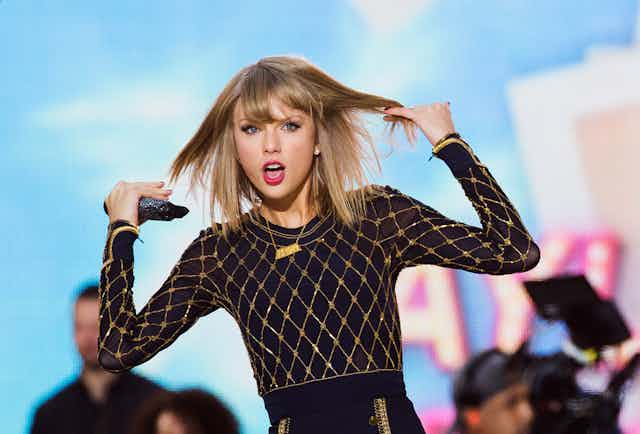Last week, JD.com and Alibaba, the two largest online retailers in China, announced their deals to sell authentic merchandise associated with Taylor Swift. JD.com will also market an exclusive fashion line that the singer will design for the Chinese market.
After having criticized the music streaming services provided by Spotify and Apple Music, Swift again finds herself at the center of the intellectual property debate. This time, the debate turns to a country notorious for being a knockoff haven.
Will her new arrangements with JD.com and Alibaba finally solve the massive counterfeiting problem in China? What are their strengths, and what are their limitations? Should other celebrities follow her lead to fend off Chinese infringers?
What these deals can achieve
Swift’s deals with JD.com and Alibaba can provide at least five main benefits. First, the dedicated online channels will provide a means of authentication. They will send important signals to the public about where to purchase official goods. Gone is the tired excuse of not knowing where to shop for authentic merchandise in China.
These channels will also help those who have difficulty distinguishing between counterfeits and legitimate products as well as those who fear to shop online. Although many of us frequently buy from Amazon and eBay, both of which were launched about two decades ago, e-commerce did not take off in China until the mid-2000s.
Second, the dedicated channels will enable Swift’s Chinese fans to develop a direct relationship with the singer. Many “Swifties” no longer find it enough to listen to her CDs and go to her concerts; they also want to have her style and wear clothes designed by her. By getting music fans to buy products directly from authentic sources, the channels will educate customers about the importance of intellectual property protection.
Third, Swift’s deals will increase her leverage in demanding response and expedited action should counterfeiting problems arise. JD.com and Alibaba may also consider taking preemptive anti-counterfeiting measures to keep the singer happy.
After all, if she is disappointed by the high volume of knockoffs found on their websites, she may stop selling products there. Any benefits the online retailers will gain from selling Swift-related counterfeits will be quickly offset by the loss of sales of authentic merchandise associated with not just the singer but also potentially other celebrities.

Fourth, the recent deals will help Swift obtain stronger protection for her merchandise on websites owned by JD.com and Alibaba. Although the official merchandise will be sold in Alibaba’s highly popular TMall, that company also runs Taobao, which reportedly has been filled with counterfeits related to the singer.
Cooperation is important because policing online networks can cost tens of millions of dollars. Determining which listing contains fake items and which does not is also difficult. Thus, by showing her willingness to cooperate, Swift has taken a highly welcome approach to working proactively with Chinese online retailers to combat counterfeiting.
Instead of relying on the stick, which foreign governments and businesses are known to use, the deals can serve as the much-needed carrot to get Chinese retailers to work harder to remove unauthorized merchandise. They will also help avoid the “bad blood” that usually develops following the use of strong-armed tactics.
Finally, the deals will send useful signals to other websites, especially those filled with knockoffs related to the singer. The hidden message is clear: if you are willing to clean up your act, you may also be able to get business from Swift and perhaps other major celebrities. Given the size of the growing celebrity-driven market, such a message will have considerable persuasive power.
What these deals will not do
Unfortunately, Swift’s deals with JD.com and Alibaba can solve only part of the massive counterfeiting problem in China.
Not everybody is willing to pay the full price for authentic products. Some cannot afford them. Some do not think they are worth the sticker price. And some are just content with buying low-quality knockoffs at much lower prices.

The problem with the counterfeiting debate – whether about China or elsewhere – is our tendency to lump the different types of counterfeit purchaser together. We also assume that counterfeits will be indistinguishable from the originals.
In a place with a massive counterfeiting problem such as China, consumers have become quite sophisticated in distinguishing products. If they buy counterfeits, they often know what they are getting into – just like those shopping in a dollar store.
To further complicate matters, most products are now made in China, and the production cost is a small fraction of the retail price. If any of these products are unfortunately leaked to the market without the right holder’s authorization – for example, when unlicensed extras have been made through a widely dreaded “ghost shift” – those low-priced, unlicensed products will have the same quality as the licensed ones.
It is therefore understandable why some Chinese consumers are so eager to buy counterfeits, especially given the significant price differences. If they are lucky enough, they may even find unlicensed goods made in the same factory using the same raw materials.
Challenging questions remain
In sum, there are still many challenging questions concerning how celebrities can protect their intellectual property in China. There are also business-driven reasons that are unrelated to intellectual property protection.
For example, did Swift reach the recent deals in part to ensure the success of her upcoming tour in China? Was cooperation with local companies badly needed given that the tour’s title, 1989, reminds people of the massive student protests in Tiananmen Square?
Regardless, Taylor Swift has certainly gone in the right direction when she agreed to team up with JD.com and Alibaba to provide authentic merchandise. Other celebrities are well-advised to follow her proactive, partner-based approach to protect their intellectual property in China.

